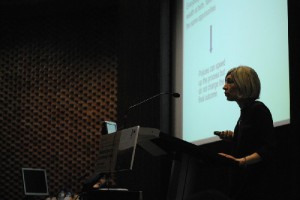UB School of Economics hosts the first Kapuscinski Development Lecture at the University of Barcelona

The Universitat de Barcelona School of Economics hosted a Kapuscinski Development Lecture devoted to persistent poverty on February 22nd, 2018. London School of Economics (LSE) professor Oriana Bandiera delivered the lecture to a full auditorium in the Aula Magna of the Faculty of Economics and Business, during which she presented the results of a recent study on poverty carried out in Bangladesh. The session was also livestreamed which allowed many more people to join the discussion.
The lecture was titled Persistent poverty, an economist’s view and had the support of European Commission, the United Nations Development Programme and the University of Barcelona. It was the Kaspuscinski Development Lecture number #101 and the first hosted at the University of Barcelona, which made the occasion even more special.
Prof. Bandiera explained that Economics is about understanding people’s lives. Although the discipline defines poverty in terms of income, she highlighted that it does so because it is more convenient for economists, because it is measurable and comparable. However, she emphasised that what Economics is really about is welfare and not money per se.
Scientific data shows that people in richer countries are happier than in poorer countries and that the richest people of a given country are also happier that the poorest of that same country. Data also shows that poverty has dropped quickly in countries that have experienced a rapid growth in recent years. However, poverty does not disappear, Prof. Bandiera warned. The reason behind this is that wealth and birth determine opportunities.
The LSE researcher revealed that, according to her research carried out in collaboration with the NGO BRAC in Bangladesh, there is a threshold below which people loose assets, while people above it accumulate assets. “That does not happen by chance”, she said, leading to the conclusion that “poverty creates poverty”.
In terms of policy, that means that money transfers must be very large in order to push the poor above the poverty threshold. “Small transfers will not have long term effects”. Prof. Bandiera highlighted that world poverty cannot be eliminated by growth alone, because not everyone has the same opportunities. “A big problem requires a big solution”, she concluded.
Oriana is Sir Anthony Atkinson Professor of Economics and Director of the Suntory and Toyota Centre for Economics and Related Disciplines (STIRCED) at the LSE. Part of her research, focuses on how to design truly efficient policies to eradicate poverty. She is also a fellow of the British Academy, the Economic Society, CEPR, BREAD and IZA.
The Kaspuscinski Development Lectures, promoted by the European Commission and the United Nations Development Programme, offer students from the European Union member states the opportunity to learn and discuss about development issues such as climate change, human rights, aid effectiveness, Europe-Africa relations, Millennium Development Goals among others.
Recent news
- Four researchers of the UB School of Economics are listed in the 2% of the world’s most influential scientists
- The second edition of the UB School of Economics Young Researchers Meeting highlighted the excellence of the research done in the field of Economics at the UB
- How the adoption of robots has influenced global sourcing activities among Spanish manufacturing firms
- A Closer Look at the MSc in Economics Class of 2025
- Call for expressions of interest for Assistant Professor positions
- A recent UB study analyzes the environmental and economic impact of flight ticket taxes in Europe
- Would you like to join us for a coffee with researchers from the Faculty?
- UB School of Economics is recruiting two tenure-elegible lecturers
- Call for expressions of interest: PhD Fellowships in Economics

Sorry, the comment form is closed at this time.